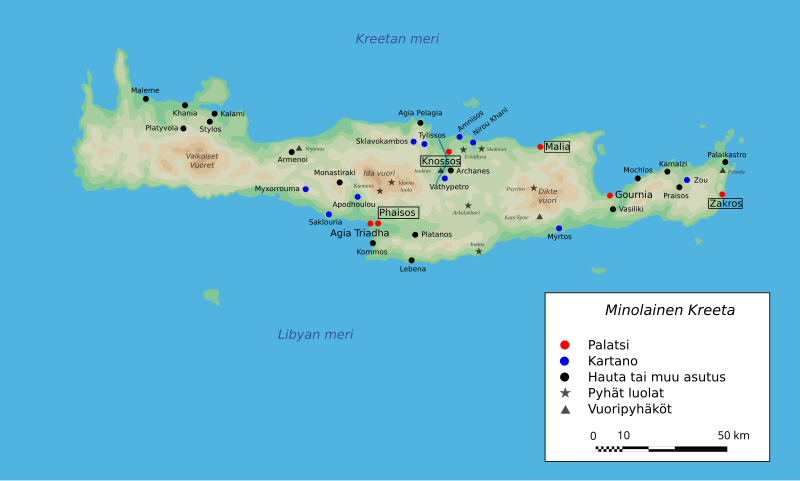Schol. A. ad Il. 2.649
“Others have instead “those who occupy hundred-citied Crete” in response to those Separatists because they say that it is “hundred-citied Crete” here but “ninety-citied” in the Odyssey. Certainly we have “hundred-citied” instead of many cities, or he has a similar and close count now, but in the Odyssey lists it more precisely as is clear in Sophocles. Some claim that the Lakedaimonian founded ten cities.”
Ariston. ἄλλοι θ’ οἳ Κρήτην <ἑκατόμπολιν ἀμφενέμοντο>: πρὸς τοὺς Χωρίζοντας (fr. 2 K.), ὅτι νῦν μὲν ἑκατόμπολιν τὴν Κρήτην, ἐν ᾿Οδυσσείᾳ (cf. τ 174) δὲ ἐνενηκοντάπολιν. ἤτοι οὖν ἑκατόμπολιν ἀντὶ τοῦ πολύπολιν, ἢ ἐπὶ τὸν σύνεγγυς καὶ ἀπαρτίζοντα ἀριθμὸν κατενήνεκται νῦν, ἐν ᾿Οδυσσείᾳ δὲ τὸ ἀκριβὲς ἐξενήνοχεν, ὡς παρὰ Σοφοκλεῖ (fr. 813 N.2 = 899 P. = 899 R.). τινὲς δέ †φασι πυλαιμένη† τὸν Λακεδαιμόνιον δεκάπολιν κτίσαι.
Strabo, 10.15
“Because the poet sometimes calls Krete “hundred-citied” but at others, “ninety-cited”, Ephorus says that ten cities were founded after the battles at Troy by the Dorians who were following Althaimenes the Argive. But he also says that Odysseus names it “ninety-cities” This argument is persuasive. But others say that ten cities were destroyed by Idomeneus’ enemies. But the poet does not claim that Krete is “hundred-citied” during the Trojan War but in his time—for he speaks in his own language even if it is the speech of those who existed then, just as in the Odyssey when he calls Crete “ninety-citied”, it would be fine to understand it in this way. But if we were to accept that, the argument would not be saved. For it is not likely that the cities were destroyed by Idomeneus’ enemies when he was at war or came home from there, since the poet says that “Idomeneus led to Crete all his companions who survived the war and the sea killed none of them.
He would have mentioned that disaster. For Odysseus certainly would not have known of the destruction of the cities because he had not encountered any of the Greeks either during his wandering or after. And one who accompanied Idomeneus against Troy and returned with him would not have known what happened at home either during the expedition or the return from there. If Idomeneus was preserved with all his companions, he would have come back strong enough they his enemies were not going to be able to deprive him of ten cities. That’s my overview of the land of the Kretans.”
Τοῦ δὲ ποιητοῦ τὸ μὲν ἑκατόμπολιν λέγοντος τὴν Κρήτην, τὸ δὲ ἐνενηκοντάπολιν, Ἔφορος μὲν ὕστερον ἐπικτισθῆναι τὰς δέκα φησὶ μετὰ τὰ Τρωικὰ ὑπὸ τῶν Ἀλθαιμένει τῷ Ἀργείῳ συνακολουθησάντων Δωριέων· τὸν μὲν οὖν Ὀδυσσέα λέγει ἐνενηκοντάπολιν ὀνομάσαι· οὗτος μὲν οὖν πιθανός ἐστιν ὁ λόγος· ἄλλοι δ᾿ ὑπὸ τῶν Ἰδομενέως ἐχθρῶν κατασκαφῆναί φασι τὰς δέκα. ἀλλ᾿ οὔτε κατὰ τὰ Τρωικά φησιν ὁ ποιητὴς εκατοντάπολιν ὑπάρξαι τὴν Κρήτην, ἀλλὰ μᾶλλον κατ᾿ αὐτόν (ἐκ γὰρ τοῦ ἰδίου προσώπου λέγει· εἰ δ᾿ ἐκ τῶν τότε ὄντων τινὸς ἦν ὁ λόγος, καθάπερ ἐν τῇ Ὀδυσσείᾳ, ἡνίκα ἐνενηκοντάπολιν φράζει, καλῶς εἶχεν ἂν οὕτω δέχεσθαι), οὔτ᾿ εἰ συγχωρήσαιμεν τοῦτό γε, ὁ ἑξῆς λόγος σώζοιτ᾿ ἄν. οὔτε γὰρ κατὰ τὴν στρατείαν οὔτε μετὰ τὴν ἐπάνοδον τὴν ἐκεῖθεν τοῦ Ἰδομενέως εἰκός ἐστιν ὑπὸ τῶν ἐχθρῶν αὐτοῦ τὰς πόλεις ἠφανίσθαι ταύτας· ὁ γὰρ ποιητὴς φήσας, πάντας δ᾿ Ἰδομενεὺς Κρήτην εἰσήγαγ᾿ ἑταίρους, οἳ φύγον ἐκ πολέμου, πόντος δέ οἱ οὔτιν᾿ἀπηύρα·
καὶ τούτου τοῦ πάθους ἐμέμνητ᾿ ἄν· οὐ γὰρ δήπου Ὀδυσσεὺς μὲν ἔγνω τὸν ἀφανισμὸν τῶν πόλεων ὁ μηδενὶ συμμίξας τῶν Ἑλλήνων μήτε κατὰ τὴν πλάνην μήθ᾿ ὕστερον. ὁ δὲ καὶ συστρατεύσας τῷ Ἰδομενεῖ καὶ συνανασωθεὶς οὐκ ἔγνω τὰ συμβάντα οἴκοι αὐτῷ οὔτε κατὰ τὴν στρατείαν οὔτε τὴν ἐπάνοδον τὴν ἐκεῖθεν· ἀλλὰ μὴν οὐδὲ μετὰ τὴν ἐπάνοδον· εἰ γὰρ μετὰ πάντων ἐσώθη τῶν ἑταίρων, ἰσχυρὸς ἐπανῆλθεν, ὥστ᾿ οὐκ ἔμελλον ἰσχύσειν οἱ ἐχθροὶ τοσοῦτον, ὅσον δέκα ἀφαιρεῖσθαι πόλεις αὐτόν. τῆς μὲν οὖν χώρας τῶν Κρητῶν τοιαύτη τις ἡ περιοδεία.

